FYC: "Drive My Car" for Best Adapted Screenplay
 Saturday, December 4, 2021 at 10:04AM
Saturday, December 4, 2021 at 10:04AM 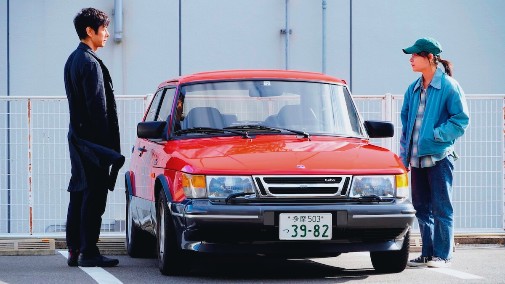
Ryusuke Hamaguchi's Drive My Car, now in select theaters, is one of 2021's best films. Still, the Japanese Oscar submission is unlikely to feature much in the awards season beyond the International Film category. Or, at least, it seemed that would be the case. In a surprising turn of events, considering its fellow victors, Drive My Car won the New York Film Critics Circle award for Best Film. Whether this victory signals a shift in its fortunes is unclear. Though, if there was any justice in the world, Drive My Car would be one of the season's biggest contenders.
At the very least, it deserves strong consideration for its screenplay, an adaptation of Haruki Murakami's homonymous short story. From little more than 20 pages, Hamaguchi unspooled a majestic three-hour epic…
Calling it epic doesn't mean its narrative is some sprawling adventure with big sets and even bigger set pieces. Such a creature couldn't have been born from Murakami's modest tale. Instead, the scope is a miniature looked at through a magnifying glass, grand in temporal scale and character. The film's barebones are the same as its literary origin, analyzing the life of an actor working on a production of Chekhov's Uncle Vanya. A recent accident caused by degenerative glaucoma made it so our protagonist, Mr. Kafuku, must hire a driver. The theater demands it for insurance reasons, but the actor is still reluctant to acquiesce as the privacy of the car is a precious part of his methodology. While driving, he listens to tape recordings of the play, running lines until he knows the text inside out.
Broken solitude notwithstanding, Kafuku soon adapts to life in the passenger's seat. His driver is a young woman called Misaki, taciturn and terse, so masterful at steering that the critical man can't find any fault in her work. The quotidian cycles of two lonely lives unfold within the transitory space of that car – yellow in the book, shining red on screen – and memory finds its way into the present. Misaki's age brings about the grief over a daughter who'd have been her age had she lived past infancy. But sorrow never walks alone, and the mourning for a lost daughter brings with it the pain of a lost wife. Whether he knows it or not, Kafuku is still reeling from his spouse's death. Reeling from the pain she caused with unfaithfulness, driven by how much he still misses her despite it all. There's guilt mixed in, too, so much it could drown one in its depths.
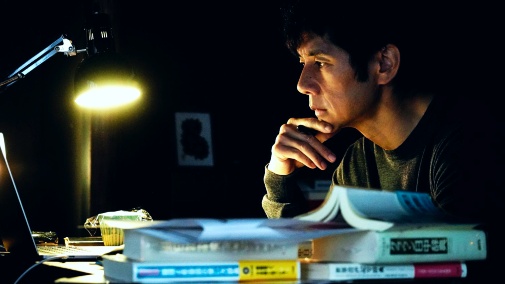
Regarding this basic summary, Hamaguchi's Drive My Car follows Murakami's, but there are stark differences in how each artist articulated the story's themes. The literary strategy puts us inside Kafuku's mind in all its prickly ugliness. We are privy to his sexism and unfulfilled wishes of violent retribution, a punishment upon those who hurt him. We also exist inside his recollections, summarily getting to know his past, listening to the conversations that still echo inside that skull years after they happened. It seems like the type of text that demands stodgy narration and forceful flashbacks.
Pulling from that text and taking details from Kino and Scheherazade in the same book, Hamaguchi indulges in neither screenwriting vice. He reaches Murakami's conclusions through mechanisms that befit the big screen rather than the page. The present action is paramount, keeping the remembrance out of the audience's reach, maintaining interiority interior. So, we get to see Kafuku and his wife as something happening in the now, a 40-minute prologue that precedes even the opening credits. The immediacy of revelation is also altered, made organic. It's not rushed in the space of a transitional sentence. The conversations between people feel real, and they happen at a pace that answers the demands of drama rather than a short story format. Moreover, the cineaste approaches the matter of adaptation through guiding principles found in the original text, changing its body to honor its truths.
It's here that I must warn you about spoilers, both thematic and otherwise. Apologies, dear reader, but to better understand Hamaguchi's craft, one must acknowledge the specific ways he transfigured the story and how it reflected ideas already present in Murakami's work. For example, take this passage from Ted Goosen's translation of Drive My Car:
…the proposition that we can look into another person's heart with perfect clarity strikes me as a fool's game. I don't care how well we think we should understand them, or how much we love them. All it can do is cause us pain. Examining your own heart, however, is another matter. I think it's possible to see what's in there if you work hard enough at it. So in the end maybe that's the challenge: to look inside your own heart as perceptively and seriously as you can, and to make peace with what you find there. If we hope to truly see another person, we have to start by looking within ourselves.
The artist must first look within himself to see the characters, see other people. Through such processes, Kafuku becomes a director of actors rather than just a performer as he was on the page. Indeed, his technique replicates Hamaguchi's distinctive approach, making actors read the script aloud, flatly, as if reading a telephone book. This repeats itself through many table reads until it becomes automatized and the text has seeped into their bones. Only then can the acting start. Oto, Kafuku's wife, inherits another facet from Hamaguchi, becoming a storyteller, a screenwriter. The cineaste goes so far as to make her carnal needs entwined with the creative process like in the Scheherazade short story, defining her as an artist first and foremost. It underlines the woman's mystery to Kafuku and us while relating her more to the man trying to transfer her from one medium to the other.
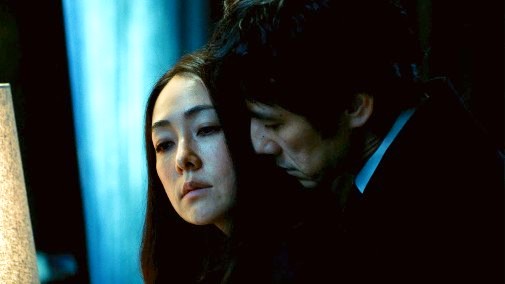
The splitting of selfhood goes further into literary reticulations. There's no pondering over the dark impulses Kafuku didn't follow. In contrast, those paths of grieving are extrapolated into other characters. We see the leading man react to the potential endpoints of mourning while drunk with guilt. He responds to people, not abstract ideas. Hamaguchi and the audience thus get to know Kafuku through his observation of others and, in the same beat, see ourselves in Kafuku's role as an observer. Every character is expanded and expansive, from the most marginal presence to Kafuku's quasi-coprotagonist – the driver Misaki.
She's no longer a vehicle for the man's introspection but a person all to herself. A complicated woman whose emotional and narrative need for Kafuku is as significant as his need for her, overcoming the mechanical nature of her part in Murakami's narrative engine. Even the geography becomes vaster, the camera following her trauma into its snowy limits, reaching a stage of epiphany where both she and the actor can find forgiveness. While the masterful editing and fluid structure mean that three-hours fly by while watching Drive My Car, their weight isn't imperceptible. As that pivotal scene – utterly absent from Murakami's text – occurs, I felt it bear down on me, squashing my heart under its might. It shook me to my core, and I can only hope others have similarly transcendent experiences with Drive My Car.
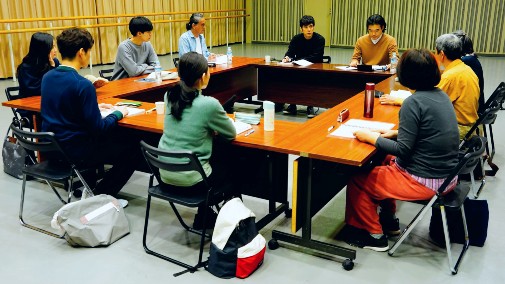
Truth be told, there's a cornucopia of adaptation choices that speak to Hamaguchi and Murakami's different geniuses, from the Hiroshima setting on film to the suddenness with which a tragedy occurs between versions of the same story. Still, since this write-up can't go as long as the movie it's about, one must come to an end. Before that last period, it's important to state how much Hamaguchi loves actors, how he respects and centers his work around them. There's an insistent idea in the short story that we're all acting through life, that the real us is never seen by anyone else. Our true selves are thus lost in translation. As he's trying to surpass - or maybe illuminate - that barrier through art, Hamaguchi documents the struggle in fiction.
The Uncle Vanya of his Drive My Car is a multilingual challenge, spoken in various idioms by performers who don't understand each other on stage. Still, through reading the text, through shared moments and shared spaces, the pains of rehearsal, and mutual frustrations, they reach a place of deep understanding. May we all reach that place. I know, in some way, Drive My Car helped me get closer to it.
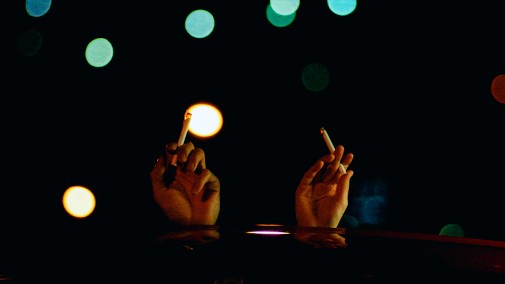
You can watch Drive My Car at selected theaters, distributed by Janus Films. Wheel of Fortune and Fantasy is another great Hamaguchi film that came out this year. Check it out if you can.

Reader Comments (4)
I may well live to regret this post, but I have reflected on this erudite review and the breezy summary immediately below.
If choosing tonight between a three hour flick where a director is “making actors read the script (from Uncle Vanya) aloud, flatly, as if reading a telephone book” or a gay rom com where a small town Christmas pageant is directed by Jennifer Coolidge “screaming to a bunch of children “do you want me to lose it?” or cooing “Mary” in a dramatic, yet sultry manner,” I unabashedly choose Single All the Way!
Finbar McBride -- Hope you still give "Drive My Car" a chance :) I certainly didn't want anyone to decide against watching Hamaguchi's film from reading my writing. In any case, have fun with "Single All the Way." Sounds delicious.
Since this film won the NYFCC award, I had been wanting to know more about it. Thank you for your informative article.
I do love Chekhov. I especially like the way all kinds of actors in all kinds of times and places, find something about his work that speaks directly to them. I would gladly watch the 3 hour production of Uncle Vanya they are preparing in this movie after watching the movie itself.
What McGill said. I just saw this today and I think it qualifies as one of the best adaptations of Uncle Vanya I've ever seen.